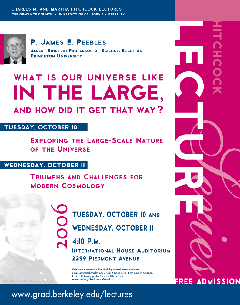
P. James E. Peebles
Albert Einstein Professor of Science Emeritus, Princeton University
Charles M. and Martha Hitchcock Lectures
October 10, 2006 — 4:10 PMInternational House Auditorium — 2299 Piedmont Avenue, Berkeley
About the Lecture The evidence is that the universe is close to uniform; it has no observable center or edges; and that it is expanding. Cosmologist James Peebles, professor emeritus at Princeton University explores the histories of these ideas and … Continued
International House Auditorium - 2299 Piedmont Avenue, Berkeley Berkeley Graduate Lectures [email protected] false MM/DD/YYYYAbout the Lecture
The evidence is that the universe is close to uniform; it has no observable center or edges; and that it is expanding. Cosmologist James Peebles, professor emeritus at Princeton University explores the histories of these ideas and the present state of the evidence for their reliability.
About P. James E. Peebles
James Peebles is one of the world’s foremost cosmologists. For over 40 years, his research and foresight have helped to transform cosmology into a focused and rapidly advancing science. Peebles laid the foundations for many modern cosmological investigations by predicting the existence of cosmic background radiation, popularizing the notion of “dark matter” in the universe, and developing a theory of how the universe evolved into galaxies. He also pioneered statistical tests to track and quantify the motions of matter in the cosmos. Peebles continues to study the related issues of cosmological tests, the nature of dark matter, and the origin of the galaxies. In 1984 he became the Albert Einstein Professor of Science at Princeton. Peebles retired from teaching in 2000, and continues to research the workings of the universe as an emeritus professor.